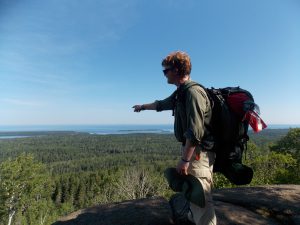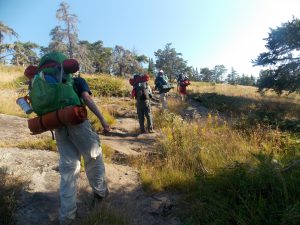 This Summer I had the chance to travel to Isle Royale (‘Royal Island’) in Lake Superior for what was a trip that would challenge me in more ways than one. Our group, comprising 3 adults and 5 boys, drove up to Copper Harbor in the Michigan Upper Peninsula and then made the four hour ferry crossing to the Isle Royale National Park. We spent the next 6 days hiking across the island, covering a total of 50 miles with backpacks and tents weighing us down every step of the way.
This Summer I had the chance to travel to Isle Royale (‘Royal Island’) in Lake Superior for what was a trip that would challenge me in more ways than one. Our group, comprising 3 adults and 5 boys, drove up to Copper Harbor in the Michigan Upper Peninsula and then made the four hour ferry crossing to the Isle Royale National Park. We spent the next 6 days hiking across the island, covering a total of 50 miles with backpacks and tents weighing us down every step of the way.
The sights were fantastic, the weather tremendous and the sheer thrill of being unreachable by text, email or phone thoroughly satisfying to say the least. But, like any adventure of this nature, there was an element of fear that accompanied the trip. What if anyone got hurt on the island? How would we handle losing all our food if critters raided our camp during the night? Might someone get seriously sick on the ferry crossing? Had we brought enough food to keep us healthy while not overloading our back packs with unnecessary weight that would hinder our progress? What if our portable water filters got clogged up?
These were real potential issues that, even with the best level of planning, could have marred our enjoyment of the trip. Sure we did our best to prepare for these eventualities. But there was of course a certain amount of risk involved— two of the boys were away from their parents on a high adventure for the first time in their lives and felt uneasy at times about the magnitude of this undertaking.
Getting out of our comfort zones is a crucial part of making scientific discoveries. Scientists can plan projects, place their orders and run their experiments. But inherent in the potential breakthrough is a certain amount of risk— trying out a novel assay for example. Or perhaps testing a compound that has never before been thought of as a serious candidate for tackling a disease. What about embracing a paradigm shift? These elements of discovery are fodder for breakthroughs and those ‘A-Ha’ moments that make science so exciting. We should be ready to step outside of convention and try something new. What Isle Royale type endeavors have you taken on lately?
Robert Deyes
Latest posts by Robert Deyes (see all)
- Royal Lessons for Scientific Discovery - October 28, 2016
- Because Timing Is Everything…. - August 18, 2014
- Grays On the Move: Whale Watching in San Diego - April 30, 2014
